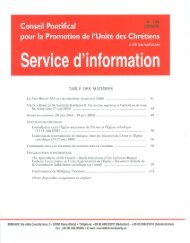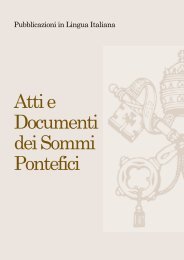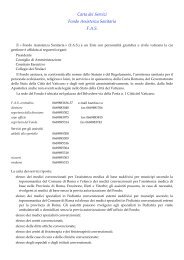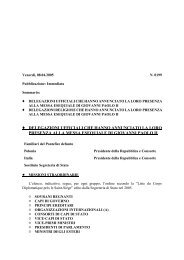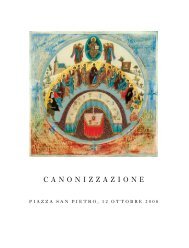10 - Vaticano
10 - Vaticano
10 - Vaticano
Create successful ePaper yourself
Turn your PDF publications into a flip-book with our unique Google optimized e-Paper software.
Acta Benedicti Pp. XVI 637<br />
objective norms governing right action are accessible to reason, prescinding<br />
from the content of revelation. According to this understanding, the role of<br />
religion in political debate is not so much to supply these norms, as if they<br />
could not be known by non-believers — still less to propose concrete political<br />
solutions, which would lie altogether outside the competence of religion —<br />
but rather to help purify and shed light upon the application of reason to the<br />
discovery of objective moral principles. This “corrective” role of religionvisà-vis<br />
reasonis not always welcomed, though, partly because distorted forms<br />
of religion, such as sectarianism and fundamentalism, can be seen to create<br />
serious social problems themselves. And in their turn, these distortions of<br />
religion arise when insufficient attention is given to the purifying and structuring<br />
role of reason within religion. It is a two-way process. Without the<br />
corrective supplied by religion, though, reason too can fall prey to distortions,<br />
as when it is manipulated by ideology, or applied in a partial way that<br />
fails to take full account of the dignity of the human person. Such misuse of<br />
reason, after all, was what gave rise to the slave trade in the first place andto<br />
many other social evils, not least the totalitarian ideologies of the twentieth<br />
century. This is why I would suggest that the world of reason and the world<br />
of faith — the world of secular rationality and the world of religious belief —<br />
need one another and should not be afraid to enter into a profound and<br />
ongoing dialogue, for the good of our civilization.<br />
Religion, in other words, is not a problem for legislators to solve, but a<br />
vital contributor to the national conversation. In this light, I cannot but<br />
voice my concern at the increasing marginalization of religion, particularly<br />
of Christianity, that is taking place in some quarters, even in nations which<br />
place a great emphasis ontolerance. There are those who would advocate<br />
that the voice of religionbe silenced, or at least relegated to the purely<br />
private sphere. There are those who argue that the public celebrationof<br />
festivals such as Christmas should be discouraged, inthe questionable belief<br />
that it might somehow offend those of other religions or none. And there are<br />
those who argue — paradoxically with the intention of eliminating discrimination<br />
— that Christians in public roles should be required at times to act<br />
against their conscience. These are worrying signs of a failure to appreciate<br />
not only the rights of believers to freedom of conscience and freedom of<br />
religion, but also the legitimate role of religion in the public square. I would<br />
invite all of you, therefore, within your respective spheres of influence, to



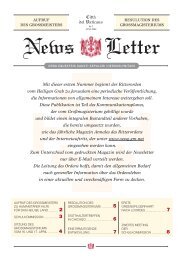
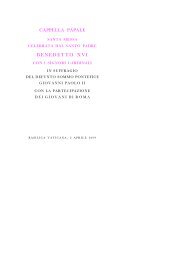
![AAS 01 [1909] - La Santa Sede](https://img.yumpu.com/51456523/1/180x260/aas-01-1909-la-santa-sede.jpg?quality=85)
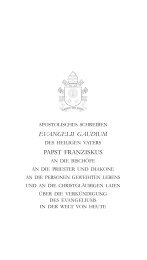
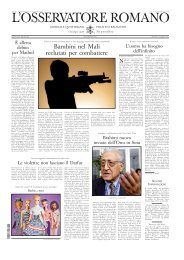
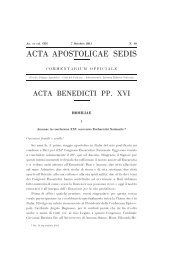
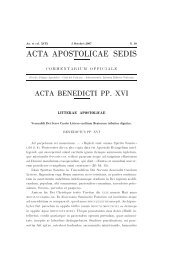
![AAS 20 [1928] - La Santa Sede](https://img.yumpu.com/19772818/1/180x260/aas-20-1928-la-santa-sede.jpg?quality=85)
